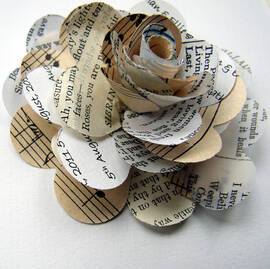 Dear Friends This is the first in a series of three or four linked contributions to the blog from Johnny and me. In this first one, I have written about how poetry helps me feel better. In the next two Johnny and I will write about music. As you read, you may like to think about music that helps you feel better, and please do share that with us if you can. Problems can make you feel lonely, but sharing ideas helps us to feel connected again. Your ideas and suggestions will be drawn together into the fourth (and maybe fifth and sixth) contribution to this blog. Or, of course, you could just write a contribution to the blog yourself :-) Either way, please do tell us all about music and poetry that helps you at difficult times! Best wishes, Tim A few years ago I was given a delightful book – “The Poetry Pharmacy”. The author suggested that poetry is a powerful mood influencer and that it can (for example) help us to feel calmer if we are frustrated, happier if we are sad, and more determined if we are unsure. I really liked this idea, as it reflected my own experience, both with poetry and with music. I mentioned this idea to Johnny a little while ago and he suggested that we write this blog. Please do share your ideas…..are there special “go to” poems or pieces of music that really help you? Before getting to the music I’m going to mention a few poems and poets that help me to feel better. I really like John Betjeman’s rhythmical, often musical delivery of his own poems, and it always makes me smile. Many years ago I was given a recording called “Banana Blush” which set some of his delightful poetry to music – do any of you know it? More specifically, reading Edward Thomas’s “Addlestrop” – a poem that I read during one of this choir’s concerts a few years ago – lifts me when I am feeling down and reminds me that we have a strong link with the natural world. It’s probably short enough to reproduce in full here.
Yes, I remember Adlestrop -- The name, because one afternoon Of heat the express-train drew up there Unwontedly. It was late June. The steam hissed. Someone cleared his throat. No one left and no one came On the bare platform. What I saw Was Adlestrop -- only the name And willows, willow-herb, and grass, And meadowsweet, and haycocks dry, No whit less still and lonely fair Than the high cloudlets in the sky. And for that minute a blackbird sang Close by, and round him, mistier, Farther and farther, all the birds Of Oxfordshire and Gloucestershire. A poem that always makes me cry (in a good way) and re-affirms my faith in the power of love, to such an extent that I always feel better when I read it, is “Small Incident In Library” by David Sutton – also short enough to reproduce in full. The little girl is lost among the books. Two years old maybe, in bobble cap, White lacy tights, red coat. She stands and looks, “Can’t see you Mummy,” Mummy, next row up, Intent on reading answers absently: “I’m here, love.” Child calls out again “Can’t see.” A large man, his intentions of the best, Stoops; “Where’s Mummy then?” Child backs away. Now the tall shelves threaten like a forest. She toddles fast between them, starts to cry, Takes the next aisle down and as her mother Rounds one end disappears behind the other. I catch the woman’s tired-eyed prettiness, We smile, shake heads. The child comes back in sight, Hurtles to her laughing, hugs her knees: “Found you!” in such ringing pure delight It fills the room, there’s no-one left who’s reading. The mother looks down, blinking. “Great soft thing.” Most poets seem to write about sad things more than happy things – just think of Philip Larkin! Of course this must be because there are so many happy things in the world that poets feel we don’t need to be reminded!! A few poets do make me laugh out loud. Ogden Nash, for example:- To keep your marriage brimming With love in the loving cup, Whenever you're wrong, admit it; Whenever you're right, shut up. or Children aren’t happy with nothing to ignore, And that’s what parents were created for. And I love Mandy Coe’s “Go To Bed With A Cheese And Pickle Sandwich”. I realise that the subject matter might be sensitive for some people, but I do believe that her intention in writing this was to highlight an important issue in an amusing way, so it’s OK to laugh – or perhaps smile wryly anyway. Go to bed with a cheese and pickle sandwich - it is life enhancing. It doesn’t chat you up - you have to make it. A cheese and pickle sandwich is never disappointing. You don’t lie there thinking: Am I too fat? Too insecure? Too fertile? Your thoughts are clear - your choices simple: To cut it in half, or not to cut it in half. how thin to slice the cheese, and where you should place the pickle. From a cheese and pickle sandwich You do not expect flowers, poems, words of love and acts of adoration. You expect what you get - cheese…….and pickle. You want, you eat, and afterwards – you have eaten. No lying awake resentful listening to it snore. Safe snacks. It comes recommended. Like many of us, I guess, I remember snippets of poems for various reasons. When I was young one of these was by John Masefield which spoke to me of exploring, challenging myself and even being useful. It was the quote at the beginning of a book by Neville Shute called “No Highway”. It still exerts a powerful force on me whenever I read it. “Therefore go forth, companion: when you find no highway more, no track, all being blind, the way to go shall glimmer in the mind. Though you have conquered earth and charted sea and planned the courses of all stars that be, adventure on, more wonders are in thee. Adventure on, for from the littlest clue has come whatever worth man ever knew; the next to lighten all men may be you!” At the time (and even now, when one searches for it on Google) it’s said to be from “The Wanderer”. However, when I once read the whole of that (long) poem. I couldn’t find it, and I have checked again whilst writing this, with no success. Can anyone tell me, please, the source of these lines? Finally, my favourite snippet is from “Finis Exoptatus” by Australian poet Adam Lindsay Gorden. Towards the end of this long poem appear the following lines – good advice for all time. “Life is mostly froth and bubble; Two things stand like stone: Kindness in another’s trouble, Courage in your own.” Of course, music is even better at affecting our moods, in part because much of it – and certainly the music that I enjoy most – is made by lots of people working together……. (to be continued)
3 Comments
David James
23/2/2021 11:10:58 pm
I don't usually get the point of poetry as so much of it seems to be intentionally confusing and obscure, but these ones do convey a message or mood. And now I realise where 'No Highway' got its title from! Character driven stories like Nevil Shute tended to write put me in a good mood.
Reply
Chris Cox
24/2/2021 10:17:23 pm
Thanks Tim
Reply
Ambrose Francis
11/6/2024 05:55:39 pm
AI music. Your post offers a fresh perspective on a widely-discussed topic. It's enlightening and thought-provoking. To delve deeper, <a href="https://youtu.be/lWy4izlCP7w?si=bPS9ku8wx1_1eUAs" target="_blank">click here</a>.
Reply
Leave a Reply. |
It's good to share!Got something you'd like to share with us all? Perhaps some interesting research, an event or experience or some other art, media or enterprise that you'd like to contribute. Archives
May 2021
Categories |

 RSS Feed
RSS Feed